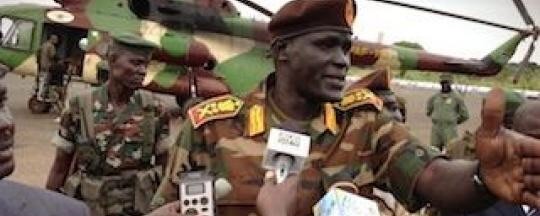A South Sudanese armed group that was accused by Human Rights Watch of forcibly recruiting child soldiers in Upper Nile State earlier this month is actually part of the army, a state official told Radio Tamazuj.
On 16 February, about 25 cases of child soldier recruitment were reported by Human Rights Watch after a research visit to Malakal. UNICEF reported another 89 cases on 21 February, after a visit by one of its education teams to Wau Shilluk near Malakal.
On announcing the mass abduction, UNICEF said the 89 missing boys were taken by an “armed group,” while declining to accuse any specific group when asked for more information.
But unless by “armed group” the UN agency meant the South Sudanese army, then they were apparently referring to the militia of Johnson Olony, which is active in the Wau Shilluk area. This militia, however, is no different from the army itself, according to the state information minister.
Gatluak Liphos, Upper Nile State Acting Minister of Information, explained in an interview yesterday that Johnson Olony’s militia has been integrated into the South Sudanese army.
Olony formerly led a part of the SSDM/A rebel coalition but was amnestied by President Salva Kiir in April 2013, after which his forces were slated for integration into Kiir’s army (SPLA-Juba). They have fought alongside Kiir’s troops since the current civil war started in December 2013.
The information minister said, “I want to tell you, there is no such thing as Olony forces – the forces that belonged to Olony are now in the Sudan People’s Liberation Army (SPLA-Juba). There are no more Olony forces any more. Olony is among the SPLA forces.”
Likewise, Human Rights Watch described Olony’s forces as “government forces,” accusing them of abducting teenage boys who ventured outside of a UN ‘protection’ area in Malakal to force them to join their ranks: “Government forces, apparently especially those led by the former militia leader Johnson Olony, recruited at least 15 children, some forcibly, within recent weeks, as part of recruitment efforts that appear mainly to be targeting adults,” HRW found.
The Human Rights Watch report accusing Olony’s forces of child recruitment in Malakal came out just days before the UNICEF announcement of the larger recruitment drive in Wau Shilluk, which lies across the river and just south of frontline area of Kodok.
Asked about the Human Rights Watch report, the Upper Nile information minister said that it was just written by “People sitting at home who say on the Internet, ‘This happened in Malakal.’ They just write it on the Internet and send it.”
“If this is true why did they not come to us here in the state and discuss with us to confirm whether this happened or not?” he said, also complaining that UNICEF allegedly did not discuss their own findings about child recruitment with the government prior to making their report.
In the meantime, Gatluak flatly denied that any child soldier recruitment took place in the state, while saying they would follow up with UNICEF to find out where they had got this information.
According to UNICEF, the large group of at least 89 children abducted from Wau Shilluk early last week have recently been sighted undergoing military training.
Speaking to Voice of America on Monday, UNICEF Communications Officer John Budd said, “Witnesses have said they are in a training camp, and witnesses have told UNICEF that, on at least three occasions, they have been marched around the town” of Wau Shilluk.
In the Human Rights Watch report, a man who was recently at the Kaka frontline said he saw children there. He said he had been picked up and thrown into a truck with six “small” children whom he believed to be around ages 13 to 15 and driven to a conflict area.
“When we got to Koka [the battle area] we were told to go to fight, given weapons, and attack together with other soldiers,” he said. “We were given uniforms, almost immediately told to fight … all of us.”
File photo: Ex-rebel leader Gen. Johnson Olony arrives in Juba in June 2013 after reaching an understanding with the South Sudanese government




